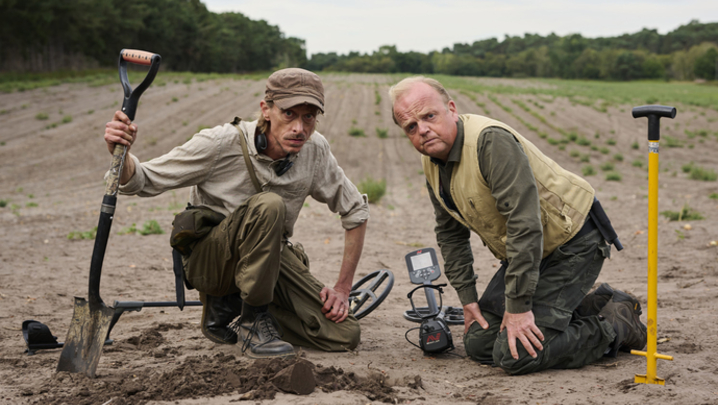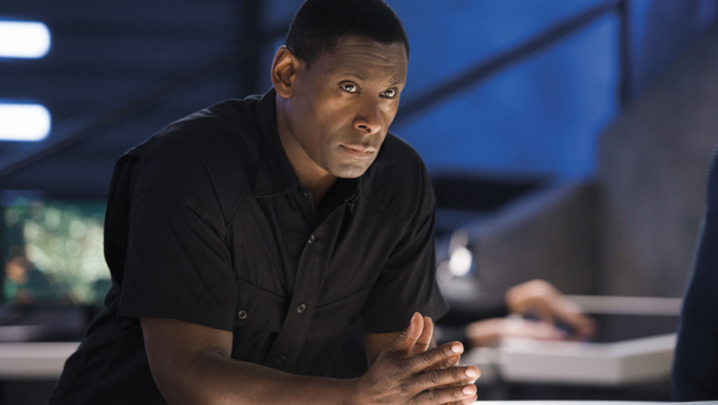The raunchy Versailles is more than a romp through history, finds Raymond Snoddy. It is a symptom of digital disruption
The tale of two multi-million-euro drama series speaks volumes about the tensions and turmoil shaking the French television industry. One is Versailles, a quintessentially French historical topic, shot in France with a French crew but produced for Canal+ in English. The show, labelled “primetime porn” thanks to its racy portrayal of life at the court of the Sun King, was created by an English writing team and mainly starred British actors barely known in France.
The other is Marseille, and features French favourite Gérard Depardieu. It is a totally French production in every respect except one – it was commissioned and paid for by Netflix, as part of the US subscription service’s attempt to establish a firm foothold in the important French market.
Ironically, it was the French-language Marseille that was flayed by the critics; their reviews of Versailles, dubbed and subtitled for broadcast in France, were much kinder. Both are believed to have attracted good audiences in France despite their different linguistic and cultural origins; Netflix, of course, never divulges ratings information.
To Claire Tavernier, former head of Fremantle’s FMX digital division, the series provide a metaphor for the tumult in the French TV industry.
“It’s an example of how things are changing: big, US-style drama; new US players coming in; TF1 [the main commercial, free-to-air channel] acquiring a lot of producers, while local, French-language drama has also had a resurgence. It’s definitely a market that’s shifting,” says Tavernier, who runs StoryTechLife, a digital content consultancy.
Tavernier sees Versailles as a defensive move against the Netflix invasion. The project, however, had been around for years in different forms.
“On the one hand, Canal+ is very, very French but, on the other, it thinks it is HBO. At board meetings they ask, ‘Why can’t we do Game of Thrones?,’ even though it costs $10m an episode,” says Tavernier, who is French.
It is obvious why Netflix made Marseille, a mayoral succession story, in French, but why should Canal+ make Versailles in English?
The answer is all about budgets, creative ambition and international sales.
Cassandre Richard, strategic advisor to Maxime Saada, CEO of Canal+, says that the French pay-TV company has the same vision as other large TV operators – to achieve the highest drama production values, which viewers now expect.
Unlike HBO and Netflix, however, Canal+ does not have a large enough domestic market to cover the cost of big productions on its own. It has to find international partners, such as Sky or Mediaset in Italy, and add financing from international sales.
“If you have a French-speaking show today it’s not very difficult to sell outside France, but it is very difficult to sell it at a good price,” says Richard, a former UK-based Viacom strategist. She cites zombie drama The Returned, which was sold to Channel 4 and many other broadcasters – but “the price that was paid was really low”.
Making Versailles in English was simply the only way to have any chance of recouping the cost of around €30m (£25m) for the 10-part series.
Canal+’s strategy, according to Richard, involves running “two strings” in parallel. One involves making shows aimed principally at a single market in the local language: Canal+ has had considerable success with Gomorra, a Sky Italia production, made in the Naples dialect. It worked because European audiences – though not American – are a lot more tolerant of subtitles today.
The other string involves big, international co-productions made in English.
“There’s an amazing show coming up in the autumn called The Young Pope, made by HBO, Sky and us. It stars Jude Law and is directed by Paolo Sorrentino. It’s set in Italy and it’s like a magnificent, 10-hour movie. We would never have been able to do it unless it was in English,” Richard argues.
Versailles could hardly have been a more appropriate project for David Wolstencroft, the American-born British writer involved in the creation of Spooks with co-writer Simon Mirren.
Wolstencroft and Mirren were looking for a TV project when along came the latest, unworkable, script for Versailles. Wolstencroft, a Cambridge history graduate who had chosen Louis XIV as his special topic, and Mirren, who left school at 16, together immediately saw the way forward.
“If you are doing Versailles you want to do it about the king and this crazy, fucked-up love triangle at the centre,” says Wolstencroft. For good measure, he stirred in a generous helping of Machiavelli’s The Prince, which runs through the series “like a stick of rock”.
Wolstencroft and Mirren and Canal+ provided the creative input. But joining the French production company Capa and Canadian production partner Incendo was distributor Zodiak, which has sold the show to more than 136 territories. In the UK, the series was acquired by the BBC.
“When we arrived in France, we thought it would be like climbing the Matterhorn in flip-flops,” recalls Wolstencroft. “Nothing like this had ever been done before, but Canal+ was an absolute rock star with us and it was the biggest supporter of our show and our vision.” He thinks that he has the making of a business book on how Versailles was made and what it means for the current TV industry.
"The English language is no longer a horror, and they want to export beyond the French-speaking world."
The French crew, he explains, were 100% on board but production schedules were longer due to union rules, so “you can forget 15-hour shooting days”.
Versailles is an important show for Canal+, which has 5.9 million subscribers in mainland France – though the number is gently declining. The service is facing increasing competition for everything, from drama to sports rights, from OTT and free-to-air digital services.
The company recently lost English Premier League rights to Altice, which owns France’s second-largest mobile operator, Numericable-SFR.
Earlier this year, in an attempt to get more regulatory flexibility on joint deals for sports rights, Canal+ Chairman, the Vivendi industrialist Vincent Bolloré, threatened to close Canal+’s loss-making pay-TV channels if losses continued to rise.
The manoeuvre failed but Bolloré is unlikely to carry out his threat because Canal+, which also owns movie arm Studio Canal, is profitable overall.
So, how unusual is it for a major French series, such as Versailles, to be made in English – and is it a harbinger of things to come?
The answer is that it’s not that unusual – and, if it is a trend, it is a slow-moving one.
Jacques Peskine, who used to run USPA, the professional association of French TV producers, says that there has always been a small corridor for English-language productions in France. In the past, however, French broadcasters wanting English-language programmes tended to buy series from the US.
“French producers are learning to look at programmes in a different way, but it’s an evolution not a revolution. I think that is very clear. The English language is no longer a horror, and they want to export beyond the French-speaking world,” Peskine explains.
A second reason that evolution is more likely lies with regulatory quotas. There is an overall 50% French-language quota. Canal+ has to spend a minimum of 3.6% of its revenues on scripted series or documentaries – at least 85% of that with independents and 85% in French.
Mo Hamza, a TV analyst with SNL Kagen, believes that co-productions in several languages “are a trend that is definitely on the up”.
However, Bernard Villegas of The Wit (Worldwide Information Tracking) believes that Versailles is neither a one-off nor a trend.
“It’s an experiment,” he says. “If it works and earns money, which is not proven yet, then, yes, it could start a trend. The trend is that French drama, like drama from every country, is now trying to become international. That is where the trend is now.”
In the battle between Versailles and Marseille history is in the lead. The second series of Marseille was commissioned last month. Shooting on the second, 10-part Versailles is due to finish around mid-July.
Season 3, Wolstencroft says, is already “being talked about very strenuously”.
And whether Versailles is a trend, a shift or an experiment, Mirren and Wolstencroft are also talking to Canal+ about something else – “something very big”.




